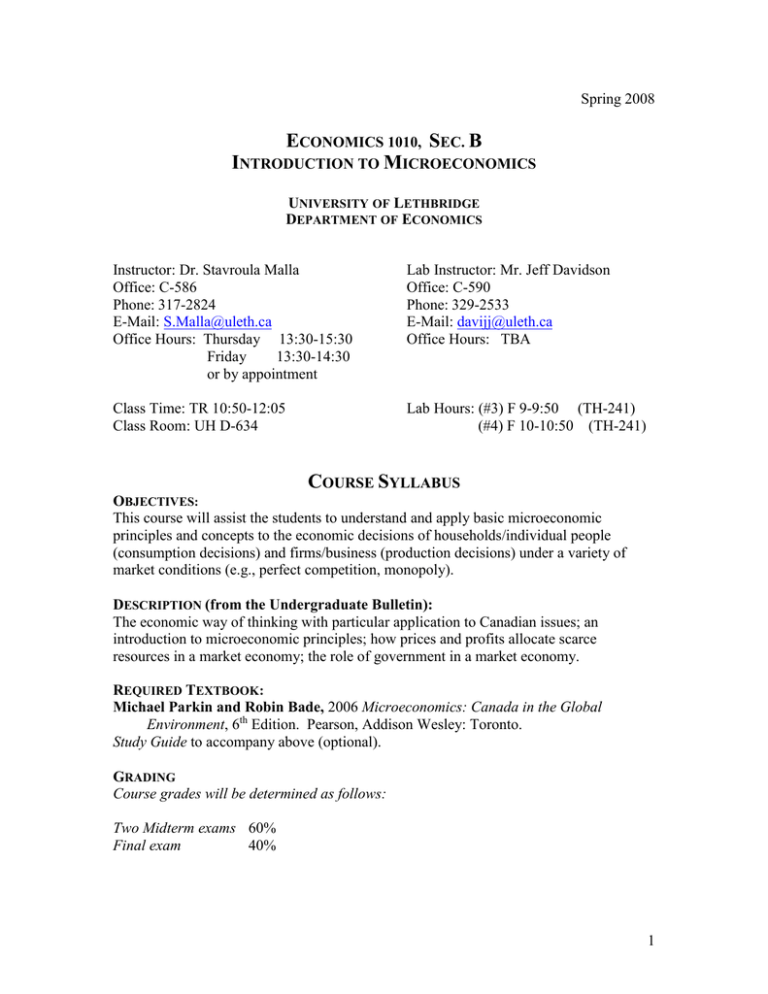
Spring 2008
ECONOMICS 1010, SEC. B
INTRODUCTION TO MICROECONOMICS
UNIVERSITY OF LETHBRIDGE
DEPARTMENT OF ECONOMICS
Instructor: Dr. Stavroula Malla
Office: C-586
Phone: 317-2824
E-Mail: S.Malla@uleth.ca
Office Hours: Thursday 13:30-15:30
Friday
13:30-14:30
or by appointment
Lab Instructor: Mr. Jeff Davidson
Office: C-590
Phone: 329-2533
E-Mail: davijj@uleth.ca
Office Hours: TBA
Class Time: TR 10:50-12:05
Class Room: UH D-634
Lab Hours: (#3) F 9-9:50 (TH-241)
(#4) F 10-10:50 (TH-241)
COURSE SYLLABUS
OBJECTIVES:
This course will assist the students to understand and apply basic microeconomic
principles and concepts to the economic decisions of households/individual people
(consumption decisions) and firms/business (production decisions) under a variety of
market conditions (e.g., perfect competition, monopoly).
DESCRIPTION (from the Undergraduate Bulletin):
The economic way of thinking with particular application to Canadian issues; an
introduction to microeconomic principles; how prices and profits allocate scarce
resources in a market economy; the role of government in a market economy.
REQUIRED TEXTBOOK:
Michael Parkin and Robin Bade, 2006 Microeconomics: Canada in the Global
Environment, 6th Edition. Pearson, Addison Wesley: Toronto.
Study Guide to accompany above (optional).
GRADING
Course grades will be determined as follows:
Two Midterm exams 60%
Final exam
40%
1
Letter grades will be based on numerical final weighted grades as follows:
A+: > 90
C+: 67-69.9
A:
85-89.9
C:
64-66.9
A-:
80-84.9
C-:
60-63.9
B+:
77-79.9
D+: 56-59.9
B:
74-76.9
D:
50-55.9
B-:
70-73.9
TENTATIVE OUTLINE:
TOPICS
READINGS
What is Economics?
Chapter 1
The Economic Problem
Chapter 2
Demand and Supply
Chapter 3
Elasticity
Chapter 4
Efficiency and Equity
Chapter 5
Markets in Action
Chapter 6
Utility and Demand
Chapter 7
Possibilities, Preferences, and Choices
Chapter 8
Organizing Production
Chapter 9
Output and Costs
Chapter 10
Perfect Competition
Chapter 11
Monopoly
Chapter 12
Monopolistic Competition and Oligopoly
Chapter 13
Demand and Supply in Factor Markets
Chapter 14
Public Goods and Taxes
Chapter 16
Competition Policy
Chapter 17
Externalities
Chapter 18
2
Lectures/Laboratories, Examinations, Absence Policy, Bonus, Academic honesty
Lectures/Laboratories:
o Lectures/Attendance in class is not mandatory and absences will not factor
into the final course grade. However, students are strongly encouraged to
attend lectures since not all materials are covered in the text book, and
exam questions will be based on the class lectures.
o Students are strongly encouraged to read the course material before
attending lectures. Unless otherwise stated in class, students should read
the entire chapter corresponding to the various topics outlined above
(including appendices).
o Laboratories are an important component of the course. Mr. Jeff Davidson
is the academic assistant for this course. All questions relating to labs
should be directed toward him. You should be registered in one of Lab 3
or Lab 4. During these laboratories, Mr. Davidson will answer any
question you may have regarding lectures or exam. In addition, each week,
approximately 20 multiple choice questions will be given to you and Mr.
Davidson will show you how to answer these questions.
o There will be no assignments.
Exams:
o All the midterms will be held in the classroom while the final exam will be
held during the final exam period (scheduled by the Registrar’s office).
o All exams will consist of multiple choice questions (Midterms: 50
multiple choice questions; Final exam: 100 multiple choice questions)
o A brief power point review notes will be distributed (via email and in class
handouts) a couple of days before each exam.
o Students may use a simple calculator during the exam. Simple means it
should have the ability to: add, subtract, multiply, divide, and pretty much
nothing else. You may NOT use any calculator that has the ability to
program alphabetic characters (No cell phone please). No electronic
translators of any type are allowed - you may use a hard copy of an
English/foreign language dictionary.
o Students should keep all graded exams. In the case of disagreement
between your recorded mark and the mark on your exam. The latter will
be taken to be correct.
Absence from Exam Policy:
o If a student is absent from examination, she/he has the option of writing a
make-up exam, or having the remaining exam weights increased
accordingly. Except under extremely unusual circumstances, if an exam is
to be missed for any valid reason (and this does happen), you must give
notification before the scheduled time of the exam by calling my office.
This is then followed up with appropriate documentation (e.g., a medical
certificate) within 48 hours of the missed exam. Failure to do one or both
of these will result in a failing grade on the examination.
3
Bonus Incentive on Performance:
o You will have an opportunity to receive 3% bonus added to your final
grade if the following condition is met. If your second midterm grade is
higher than the first one, you will receive 1.5% bonus, and if your final
exam grade is higher than your second midterm grade, you will receive the
other 1.5% bonus. This bonus is designed to give you an incentive to
perform better toward the end of the course.
Academic honesty:
o Please be aware of and adhere to the principles and policies regarding
academic honesty, which can be found in the university calendar.
Plagiarism, cheating, duplication, confidential materials, and
misrepresentation are serious offenses with important consequences.
4
